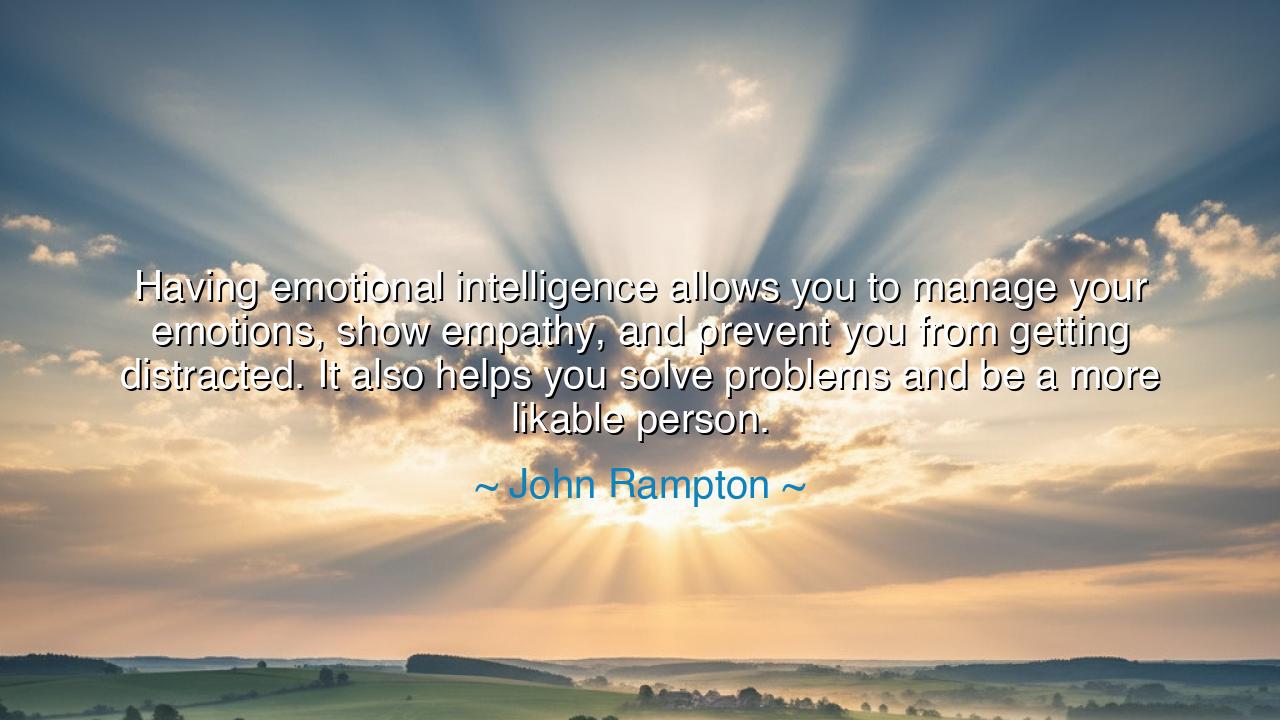
Having emotional intelligence allows you to manage your emotions
Having emotional intelligence allows you to manage your emotions, show empathy, and prevent you from getting distracted. It also helps you solve problems and be a more likable person.






“Having emotional intelligence allows you to manage your emotions, show empathy, and prevent you from getting distracted. It also helps you solve problems and be a more likable person.” – John Rampton
These words, spoken by John Rampton, are not merely advice for success — they are a testament to the ancient truth that mastery over the self is the foundation of all mastery. In this reflection, Rampton honors the power of emotional intelligence — that quiet strength that governs the heart and steadies the mind. He teaches that intellect alone is not enough; brilliance without balance is like a sword without a hilt. The man who conquers his emotions, who learns to understand others, and who remains calm in the face of turmoil, possesses a power greater than any title or fortune. Such a person not only excels in their work but also elevates those around them, for empathy and composure are the marks of true wisdom.
The origin of this teaching lies in the long tradition of philosophy and psychology that has sought to define what makes a person truly capable. Though Rampton speaks as a modern entrepreneur, his insight echoes the wisdom of ancient thinkers. The Stoics of Greece and Rome taught the same principle: that happiness and success arise not from the world around us, but from how we govern ourselves within it. Marcus Aurelius, emperor and philosopher, wrote that a man’s true power lies in his ability to “be the master of his own soul.” Likewise, the sages of the East — Confucius and Lao Tzu — spoke of harmony between emotion and reason as the path to inner peace and effective leadership. Rampton’s words are a modern echo of these timeless voices, reminding us that in every age, the mastery of emotion remains the cornerstone of greatness.
To manage one’s emotions is not to suppress them, but to wield them with discernment. Anger, fear, and pride are wild horses that can destroy a man if left unbridled — yet when tamed, they become the engines of courage, vigilance, and confidence. Rampton’s teaching urges us to find this balance. For when emotion governs reason, chaos follows; but when reason governs emotion, clarity and purpose arise. This is why emotional intelligence is not weakness, but strength refined — the ability to act with calm when others tremble, to listen when others shout, and to see the heart of a matter when others are blinded by impulse.
Consider the example of Nelson Mandela, who spent twenty-seven years imprisoned and emerged without bitterness. The world expected anger; he chose forgiveness. His emotional intelligence transformed an entire nation. By mastering his own heart, he softened the hearts of others and turned division into unity. His greatness did not lie in intellect alone, but in his ability to manage emotion, show empathy, and focus on peace, even when injustice cried out for vengeance. Mandela’s life is proof that emotional mastery does not merely solve problems — it changes the course of history.
Rampton also reminds us that empathy — the ability to feel what others feel — is not just kindness, but power. It is the key to collaboration, leadership, and trust. In every sphere of life, from family to business, it is empathy that transforms mere interaction into connection. A leader who understands his people inspires loyalty; a friend who listens heals more deeply than a thousand words can. Empathy makes us likable, not in the shallow sense of charm, but in the profound sense of being human — approachable, authentic, and compassionate. It is the invisible force that binds community, and without it, success turns hollow.
But Rampton warns also of distraction — the scattering of the mind that comes when emotion runs unchecked. The one who is easily provoked, who lets every slight disturb his peace, becomes a servant to circumstance. Yet the one who steadies his thoughts and emotions walks through storms untouched. Emotional intelligence, therefore, is not just social grace; it is inner discipline, the art of keeping one’s focus amidst noise. It is what allows a man to face adversity with patience, to solve problems not through haste, but through reflection.
Let this be the lesson carried forward: cultivate emotional intelligence as the highest form of strength. Study your own emotions as a scholar studies the stars — observe them, understand them, and guide them toward purpose. Practice empathy each day, for it is the bridge between hearts. When anger rises, breathe; when pride tempts you, listen; when fear clouds your path, remember your values. For the one who rules his emotions rules his destiny. As Rampton teaches, intelligence of the mind may open doors, but intelligence of the heart keeps them open, earning not only success, but the respect and love that make success worth having.






AAdministratorAdministrator
Welcome, honored guests. Please leave a comment, we will respond soon